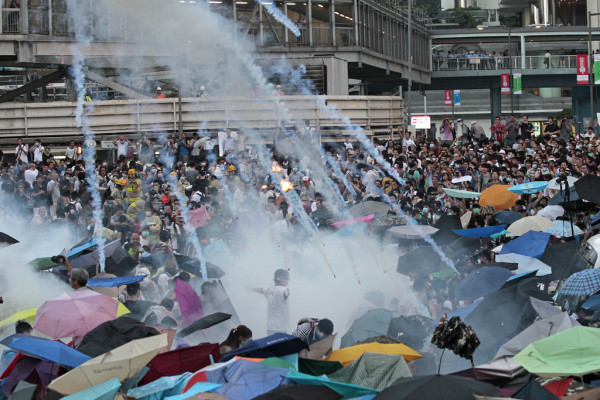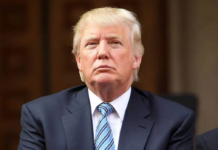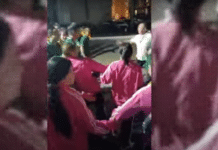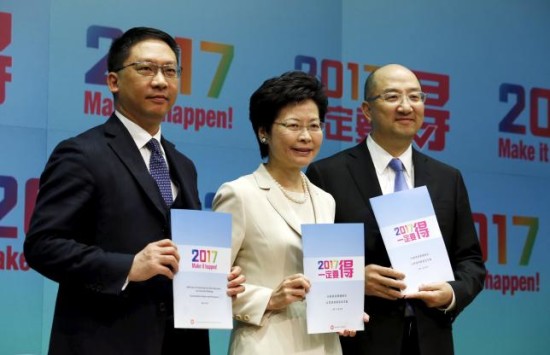
Hong Kong government’s political reform proposals meet with mass opposition
Vincent Kolo, chinaworker.info
The prolonged battle over Hong Kong’s electoral system has entered a new phase with the territory’s government presenting its final proposal for the 2017 elections which will choose the city’s next Chief Executive. The government is proposing an extremely restrictive ‘Iran-style’ election model with vetted candidates as previously outlined by Beijing last August. That became the trigger for last year’s Umbrella Revolution which saw parts of the city occupied by democracy protesters for 79 days.
To take effect the reform plan must be endorsed by a two-thirds majority in Hong Kong’s pseudo-parliament, the Legislative Council (Legco). The vote, which will take place in June, looks likely to go against the government barring any last minute surprises. Despite an unprecedented fear campaign – invoking the threat of a stock market crash and even the cancellation of Hong Kong’s autonomous status by the Chinese Communist Party (CCP) dictatorship – the government’s campaign has misfired badly. It has so far only succeeded in further antagonising public opinion, and as a result has failed in its ultimate aim which is to split the 27-member pan-democratic opposition bloc in the Legco and win over four defectors – enough to ensure passage of the legislation.
There is a very simple explanation for this state of affairs and the uncharacteristic show of ‘backbone’ by bourgeois opposition politicians. The reason is the mass Umbrella Movement which despite not achieving its aim of free elections did transform the political atmosphere in Hong Kong.
Socialist Action (the supporters of the CWI in Hong Kong) and chinaworker.info said at the time that despite the failure of the Umbrella Movement to win concessions, which led some participants to draw defeatist conclusions, the outcome was a pyrrhic victory for the government (Wikipedia: A Pyrrhic victory is a victory that inflicts such a devastating toll on the victor that it is tantamount to defeat). As the Legco vote nears, and while a last-minute betrayal by some right-wing pan-democratic legislators cannot be excluded (a possibility we examine below), it is clear that the pan-democratic leaders are under much greater pressure to reject the government’s proposals – on pain of political extinction.
“Make it happen”
In mid-April the Hong Kong government launched its propaganda campaign “Make it Happen” to gain acceptance for its electoral reform package. The government’s argument, backed up by threats, is that even those who don’t like the proposals should think tactically and “pocket” the reform, so that the alleged process of democratic reform (there is no such ‘process’) can move forward. Reject this plan, they say, and there will be no new opportunities to democratise the system for years to come. Accordingly, not only will progress towards one-person-one-vote be halted for the Chief Executive election, but also for the Legco which is currently only half-elected with half its seats allocated to business and professional groups.
The government’s problem is that too many people have seen through these arguments. It is widely understood among that half of the population who reject the government’s reform package that its passage will only serve to legitimise the CCP’s bogus democracy under which the dictatorship’s representatives pick all the candidates.
Rather than being a stepping stone towards further democratic openings at a later stage as the government claims, the real aim of the current proposals is to call a halt to Hong Kong’s ‘democratic development’, which has become more and more irksome to Beijing, especially under Xi Jinping who has tightened the regime’s repressive controls in every area. The CCP wants to concentrate greater powers in the hands of Hong Kong’s Chief Executive, using the fake election system to provide a cloak of legitimacy for this, and at the same time weaken other organs such as the Legco, which despite its limitations exercises a certain check on the government’s power.
Beijing’s master plan for a less democratic Hong Kong encompasses eventual changes to electoral boundaries for the Legco to eliminate ‘troublesome’ smaller parties. Crucially, it also involves the resurrection of draconian national security legislation, known as Article 23, to suppress Hong Kong’s ‘protest culture’. A Chief Executive elected according to Beijing’s pseudo universal suffrage is seen as being in a stronger position to push through Article 23, which was defeated 12 years ago by mass protests.
That this strategy could now be torpedoed by pan-democratic legislators exercising their power of veto will only reinforce the CCP’s conviction that democracy has already gone too far in Hong Kong and represents not only an impediment to its control over Hong Kong but also a source of instability for China itself.
Support falling
Clearly, things are not going well for the government’s campaign, which has mainly consisted of ‘guerrilla style’ unannounced public appearances by top Hong Kong officials to avoid anti-government protests. The campaign has become a fiasco, leading some establishment figures to call for it to be abandoned. The net result so far has been to reduce the numbers “willing to accept” the government’s proposal from 47 percent on 29 April (Now TV) to 42.5 percent in a poll published on 12 May (SCMP).
Unconfirmed reports say that Beijing set a target to raise public acceptance of the reform plan to 70 percent. Clearly, that is not going to happen. While the administration may still hope public pressure can bring about the four pan-democratic defections, this campaign is more about preparing for the defeat of its package, when Beijing’s propaganda machinery will blame the pan-democrats for blocking ‘universal suffrage’ in Hong Kong.
The pan-democratic leaders are attempting to use the current standoff to rebuild their support, which has been badly dented by the Umbrella protests in which they were relegated to a secondary role. This time last year, the right-wing or ‘moderate’ pan-democrats were still convinced they could win some concessions from Beijing and were prepared to settle for far less than the “true democracy” they now claim as a principle. This time last year, Emily Lau Wai-hing and other leaders of the Democratic Party, stated not only that they could accept Beijing’s nomination committee – if ‘democratised’ – but also that free nomination of candidates (public nomination) was not a condition for an eventual settlement. It was Beijing that closed that door with its August ruling, throwing the pan-democratic leaders and their compromise approach into crisis.
It is last year’s mass movement that explains the current position of the pan-democrats which is very different – and for the government more problematic – compared to the previous political reform battle in 2010. At that time, the Democratic Party and its ‘moderate’ allies entered into secret negotiations with Beijing, which led them to vote for the government’s reform package on the pretext of winning small pseudo concessions. The Democratic Party was widely ostracised for this betrayal and lost 42 percent of its vote in the following Legco elections of 2012.
Although today’s events are not a replay of 2010, it would be a mistake to think the ‘moderates’ have shifted to a more combative position, or realised as a result of these explosive battles that the road of compromise and reform is doomed to failure. While more and more, especially among the younger generation, are awakening to the fact that only a mass movement in Hong Kong and in China to overthrow one-party dictatorship is capable of securing genuine democracy, this is a closed book to the pan-democratic leaders. This means, unfortunately, that these politicians and their redundant strategy of lobbying for gradual and incremental change, remains as an obstacle to the building of a class struggle orientated mass movement which is the only way to defeat the dictatorship.
Nevertheless, with the government offering nothing, not even cosmetic concessions, and the hot embers of the Umbrella Movement still glowing, it is not possible for the pan-democratic right-wing to repeat their betrayal of 2010. In a recent radio debate, Lau of the Democratic Party was taunted by Executive Council convenor Lam Woon-kwong, who said the pan-democrats would be marginalised if they vetoed the reform package. “If we support the package, we would be marginalised by our own supporters,” was Lau’s reply. An opinion poll conducted by TVB showed that 71.4 percent of pan-democratic voters said they would refuse to vote for any candidate who voted for the government’s reform package.
The columnist Steven Vines in the South China Morning Post summarised the acute dilemma that faces the pan democratic leadership: “The reality is that if the democratic legislators forsake their frequent pledges to block the government’s proposals, there will be an eruption of anger and a deepening feeling that trying to obtain reform through constitutional channels needs to be abandoned in favour of confrontation on the streets.”
‘Key suspects’
The government and the media have an open list of ‘key suspects’ – the right-wing pan-democratic legislators considered most likely to defect to the government camp. But given the changed balance of forces today, even the government’s targets seem to be adhering to the need to veto the reforms, fully aware that they would become ‘political lepers’ if they defected to the government’s camp. Unlike 2010, it would be impossible for the leaders of the pan-democratic camp to offer them an alibi and a way to return afterwards.
Given the history of last-minute deals in Hong Kong politics (in 2010 the Democratic Party changed its position to support the government’s proposal three days before the vote in the Legco) there is still a small possibility the government can win four defectors to its side. There are unofficial behind-the-scenes soundings to suggest that an ‘acceptable’ pan-democrat (i.e. considered harmless by Beijing) may be allowed to run as one of the three candidates for Chief Executive. But there’s no guarantee such a deal would not be broken as soon as the reform package is approved. Any such deal is extremely unlikely because even with massive resources to manipulate the public vote, Beijing fears that with a pan-democrat running it could lose control of the election.
The final possible refuge for would-be defectors could be the argument that an ‘even worse’ outcome must be averted. This scenario would be based on taking at face value the government’s threats to cancel further rounds of electoral reform, and the even more incendiary threat to abolish the ‘one country, two systems’ arrangement and impose central control over Hong Kong.
But how credible are such threats in the current situation? This is not about the formal or ‘constitutional’ powers of the central government, but the actual political balance of forces. It was Beijing that restrained the Hong Kong government during the Umbrella Movement from unleashing even greater police repression, to avoid further inflaming the situation with the risk that at a certain point and level of intensity the Hong Kong movement could spill over into mainland China. This is connected to the array of difficulties that currently face Xi Jinping and the central government with a sharpening internal power struggle, growing international tensions, and so far unsuccessful attempts to arrest a severe economic downturn.
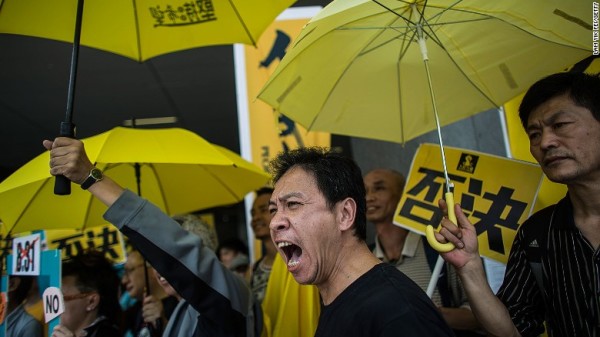
Referendum?
The rejection of the government’s electoral reform package will be a significant defeat for the CCP regime and the Hong Kong government. It involves a loss of political prestige and awards a ‘posthumous victory’ to the Umbrella Revolution.
Far from emerging strengthened from this showdown, however, the pan-democratic bloc shows increasing signs of disarray and fragmentation. They are preparing to wield the veto with a sense of inevitability rather than hunger for new battles. The Umbrella Movement gave the leaders of the pan-democratic bloc a shocking glimpse into the future – a future in which they are marginalised!
The proposal of Democratic Party veteran Albert Ho Chun-yan to resign his Legco ‘super seat’ later this year and trigger a city-wide ‘referendum’ (by-election) on the reform package is mainly driven by the desire to shore up the Democratic Party’s position and prevent further losses to its ‘radical’ rivals. The Democratic Party opposed and actively sabotaged the referendum campaign of 2010, similarly triggered by resignations, and their conversion to this tactic today inevitably raises a lot of questions. As more details emerge it is becoming clear that the 2015 version of the referendum tactic is more restrictive and top-controlled by the Democratic Party establishment. These organisational constraints will surely also find expression in a less radical programme and appeal, especially among the younger generation.
These contradictions have been forced into the open by the decision earlier this month of the youth group Scholarism to withdraw from the leadership of the referendum campaign. This was enough for the Democratic Party tops, who from the outset have been split over the pros and cons of such a campaign, to say they are re-evaluating the plan and will make a decision after the vote in the Legco. The larger Federation of Students, which is now undergoing a sharp internal crisis, is also likely to distance itself from the Democratic party-led referendum.
Scholarism, justifiably in our opinion, raised “reservations” about the insistence of the Democratic Party that all organisations participating in the committee of the referendum campaign must “leave aside all the arguments in the pan-democratic camp”. This is an outrageous but unfortunately typical example of the lack of basic democracy in campaigns dominated by the pan-democratic establishment. Why should any mass campaign which brings together different forces to achieve a specific action (in this case a ‘referendum’ vote against the government reform) impose a gagging order upon the participating groups preventing them from raising differences?
As we also saw in the largely phantom ‘five-side platform’ set up by the pan-democratic leaders and their allies during the Umbrella Movement, which enjoyed little actual support inside the movement, this represents a fundamentally undemocratic approach to building and running a mass movement. The Democratic Party’s attempt to ban “arguments” (i.e. opinions other than their own) has more in common with CCP-style politics than a democratic approach. This further underlines the sharp contrast between the referendum campaign of 2015 and its forerunner. If this undemocratic approach is not firmly rejected, it will render the campaign completely ineffective as a vehicle for genuine anti-government struggle. A fear of democratic debate and grassroots involvement is connected to the Democratic Party’s desire to avoid ‘radicalism’ and mass struggle, in favour of accommodation with the authorities.
Student Federation splits
In a parallel development, the Student Federation has been plunged into the most serious crisis in its 57-year history, as four of eight university student unions have voted to disaffiliate. The votes to split have been initiated by the right-wing populist and racist nativist movement.
The nativists’ attacks on the Student Federation leadership, often hysterical and personalised, have struck a chord with a layer of students unhappy with what is widely seen as a bureaucratic organisation, while this does not mean these layers support the nativists’ other political positions. The nativists are not a politically coherent or organised movement but rather a loose ‘anarchistic’ trend that mobilises mainly through a massive presence on social media.
Unfortunately, the undemocratic methods of the pan-democratic leadership and their history of shabby deals with the government has created a breeding ground for the confused and contradictory ideas of the nativists, who combine anti-China and pro-independence rhetoric with an ‘anti-hijacking’ narrative against the pan-democrats, ideas that get an echo in today’s political climate.
The Student Federation leaders are now paying the price for not distancing themselves clearly from the pan-democratic leaders, in terms of politics and methods, and even using similar top-down methods when they have been elevated to a leading role in mass struggles – as was the case in the Umbrella Movement. This is also a failing of the grouping ‘Left 21’ whose members have been influential in the leadership of the Student Federation for several years without clearly building support among students for left ideas as a base for their leadership positions.
Their ‘committee approach’ and the lack of mass campaigning on the campuses to build an active membership with genuine democratic structures has unfortunately opened the door for the nativists and their ‘facebook rebellion’ to achieve some rapid successes. A mass student organisation with a democratic tradition and politically conscious activists would have been able to withstand what on the part of the nativists is a conscious wrecking campaign.
The break-up of the Student Federation represents a setback and not only within the student field. It will inevitably complicate the situation in the universities and could make it more difficult to mobilise for united campaigns by students in the future. The nativists themselves are incapable of leading any real struggle or securing victories over the authorities. Their ‘anti-everything’ mantra means – as was shown many times in the course of the Umbrella struggle – they do not try to organise an alternative to the leadership they so roundly condemn and are mainly concerned with self-publicity. This is a complicating factor in the current political conjuncture, especially the growth of racist ideas, but the inherently contradictory and unstable nature of the nativist currents also points to a future of conflicts, splits and crises among the nativists themselves.
Workers’ alternative
The CCP regime is staring at probable defeat over Hong Kong’s political reform. While it can live with this situation, it represents a setback for its plans and the prospect of continuing political instability that could later spill into China. What is lacking in the situation is a mass workers’ alternative that can take advantage of the regime’s discomfort and press forward.
This is a key lesson from the Umbrella Movement and from the lack of a fighting strategy from the leaders of the pan-democratic camp. These parties and political groups are locked into a capitalist perspective – that the ‘free enterprise’ system is the economic framework for ‘democracy’. Yet Hong Kong and China prove irrefutably that when it suits their interests the capitalists are stalwart defenders of dictatorship.
As Socialist Action has explained, democracy in Hong Kong and China can only be achieved through class struggle to break the dictatorship of the dominant billionaire families and their allies in the CCP regime. For this to be possible, a new workers’ party with socialist policies needs to be built on both sides of the border and indeed internationally.
